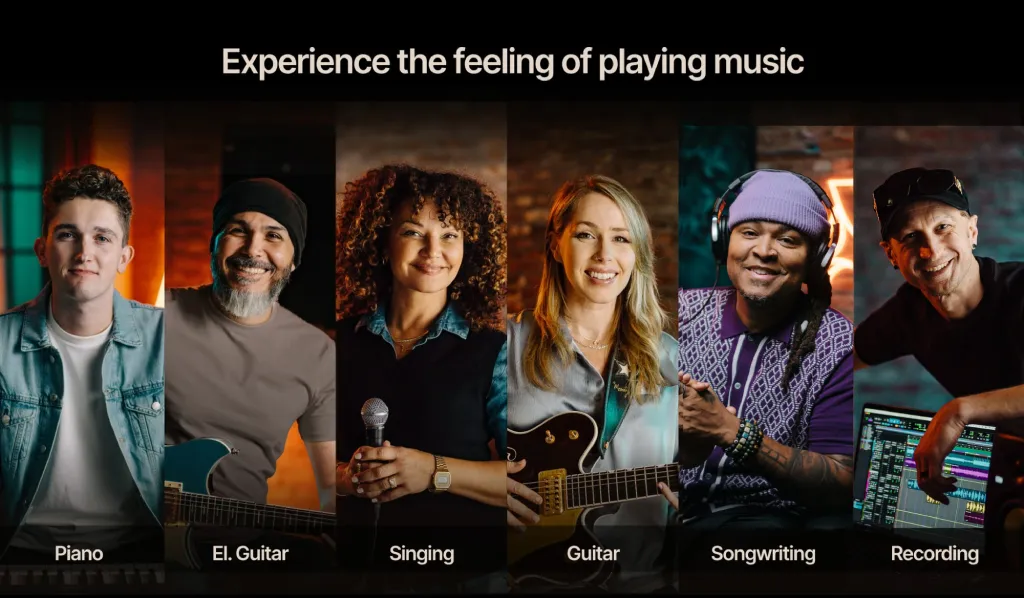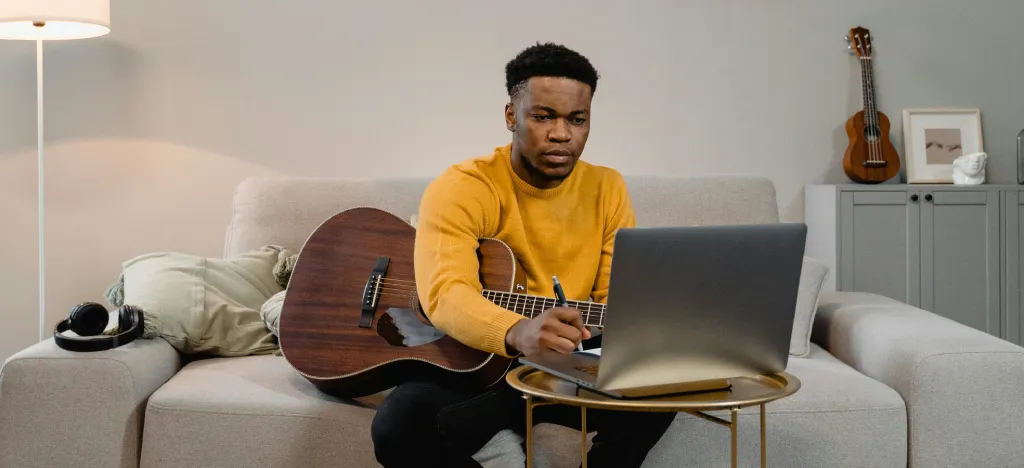Learning a musical instrument can be one of the most rewarding hobbies you’ll ever take up. And let’s be honest, it’s way more fun than doom-scrolling on your phone. Whether you’re looking to discover your inner artist, relax after a long day, or just have a bit of fun, music has this way of making life better. So, where do you begin? If you’re a total novice, choosing the right instrument is half the battle. Here are some of the easiest options to get you started.
- What makes an instrument easy to learn?
- Why the ukulele is a great first instrument
- Is piano the easiest instrument to start with?
- How easy is it to learn guitar as a beginner?
- Why bass guitar is easier than you think
- Singing: The easiest instrument you already have
- Why drums (bongos & cajón) are great for beginners
- Harmonica: A tiny instrument that’s easy to play
- What is the hardest instrument to learn?
- How to choose the right instrument for you
What makes an instrument easy to learn?
Certain instruments allow beginners to play real songs faster, keeping motivation high. Here’s what makes an instrument beginner-friendly:
Quick sound production – If you can make a pleasant sound right away, you’re more likely to stay motivated. (Looking at you, violin, with your squeaky first months!)
Simple playing technique – Less finger dexterity or breath control required = easier to pick up.
Low physical strain – No need for extreme lung power, heavy lifting, or complex hand coordination.
Fast learning curve – If you can play a recognizable tune within days or weeks, you’re more likely to stick with it.
Affordability & accessibility – Some instruments cost thousands, while others are affordable and widely available.
Now, let’s explore the easiest musical instruments to learn — backed by research and experts.
Why the ukulele is a great first instrument
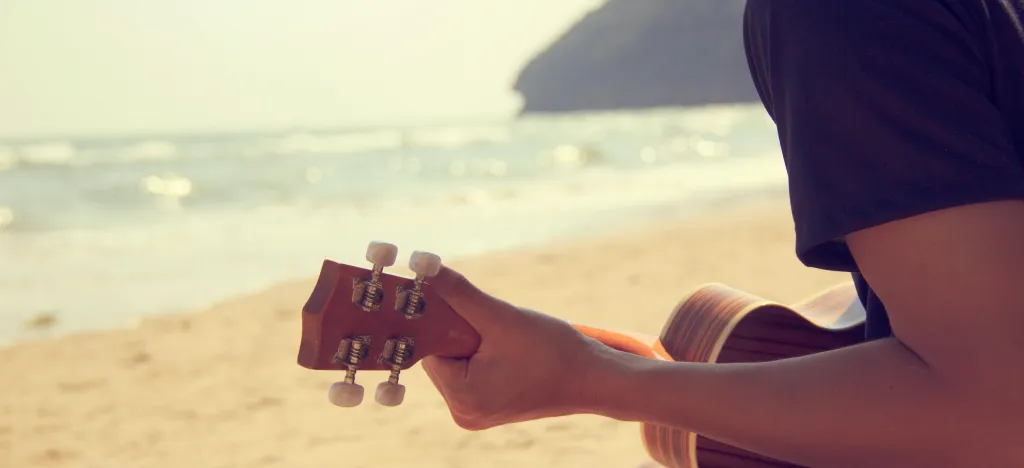 If the ukulele were a person, it’d be the one cracking jokes at the party and handing out free cocktails. It’s easygoing, always a good time, and everyone loves it. The ukulele is a top pick for beginner musical instruments, loved for its cheerful sound, affordability, and simple chords. With just four strings and a sound that instantly transports you to somewhere sunny, it’s really fun to play. The best part? You don’t need years of training to strum a few chords and impress your friends. It’s light, portable, and perfect for taking anywhere — beach, barbecue, or even your living room on a rainy Sunday.
If the ukulele were a person, it’d be the one cracking jokes at the party and handing out free cocktails. It’s easygoing, always a good time, and everyone loves it. The ukulele is a top pick for beginner musical instruments, loved for its cheerful sound, affordability, and simple chords. With just four strings and a sound that instantly transports you to somewhere sunny, it’s really fun to play. The best part? You don’t need years of training to strum a few chords and impress your friends. It’s light, portable, and perfect for taking anywhere — beach, barbecue, or even your living room on a rainy Sunday.
Why the ukulele is easy to learn?
Simple chord shapes (many can be played with one or two fingers!)
Small and lightweight—easy to carry and hold
Songs sound cheerful even with basic skills
Affordable (beginner ukuleles start at $50)
📖 Research from music schools (including ours) found that ukulele students can play full songs within their first lesson, making it one of the fastest instruments to learn.
⚡How fast can you learn ukulele?
Strumming a song within a day or two is realistic. Within a couple of weeks, you can play multiple full songs.
💡 ARTMASTER TIP: The ukulele is a fantastic beginner instrument for children – easy to learn, small and loads of fun!
Is piano the easiest instrument to start with?
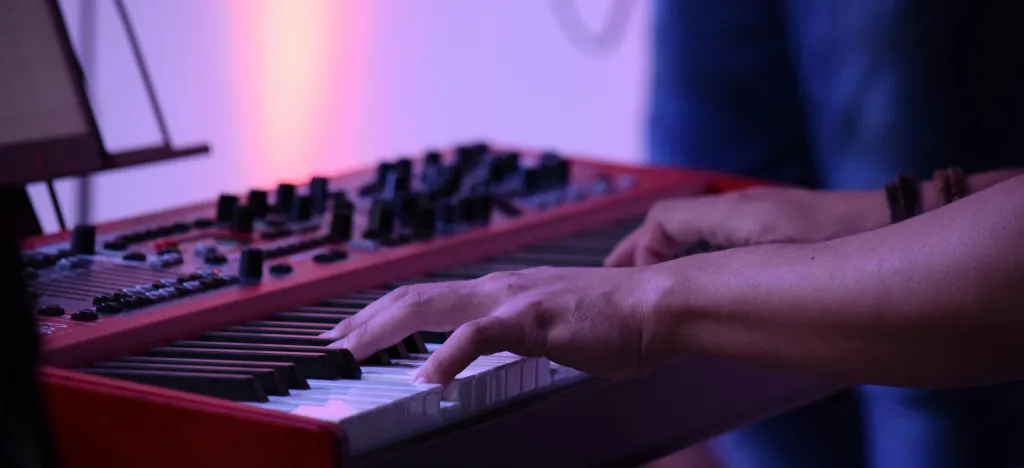 The piano might look a bit intimidating at first—all those keys! But here’s the thing: it’s laid out like a musical map, and once you get the hang of it, it’s surprisingly intuitive. Once you figure out where middle C is, everything else falls into place. It’s one of those instruments where even pressing a few random notes can sound oddly impressive.
The piano might look a bit intimidating at first—all those keys! But here’s the thing: it’s laid out like a musical map, and once you get the hang of it, it’s surprisingly intuitive. Once you figure out where middle C is, everything else falls into place. It’s one of those instruments where even pressing a few random notes can sound oddly impressive.
If the full-sized piano feels like a big commitment (or your living room isn’t quite Buckingham Palace), the keyboard is your go-to. It’s portable, often packed with features like drum loops and tutorials, and makes learning even more fun. Whether you’re channelling your inner Beethoven or just trying to master the intro to Clocks by Coldplay, the keyboard or piano is perfect for beginners who want to get into music without feeling out of their depth.
Why the piano is easy to learn?
Instant sound production (no tuning or special technique required)
Logical layout of notes (everything is in order, making it easy to visualize music)
Great for learning chords and melodies simultaneously
Digital keyboards are affordable ($100+ for a good beginner model)
📖 Research: A study in The Journal of Research in Music Education found that students who start on the piano develop stronger rhythm and note recognition skills compared to other beginner instrumentalists.
⚡How fast can you learn piano?
You can play simple one-hand melodies in an hour or two and full song chords in a few lessons.
💡 ARTMASTER TIP: In David Bennett's Piano for Beginners course, you'll be playing 'Clocks' by Lesson 4. Try it out for free👇. Read more articles on learning piano here.
How easy is it to learn guitar as a beginner?
Ever pictured yourself as the star of a campfire singalong, strumming away while everyone awkwardly forgets the second verse? The guitar is versatile, iconic, and perfect for those "Wonderwall" moments. With just a handful of easy guitar chords, you can belt out everything from Beatles classics to indie hits. Start with an acoustic—it’s straightforward, no cables required, and sounds great. And, let’s be honest, there’s nothing quite like the satisfaction of nailing your first song.
Why is the guitar a good beginner instrument?
Basic open chords allow you to play thousands of songs
Tons of free online tutorials available
Acoustic guitars are widely accessible and relatively affordable ($100+)
📖 Studies show that beginners can play simple three-chord or four-chord songs within a few weeks, making guitar an accessible choice for self-taught musicians.
⚡How fast can you learn to play guitar?
Strumming simple songs within a few weeks is realistic.
💡 ARTMASTER TIP: For more tips on getting started on guitar, check out our guides or try one of our beginner courses for FREE.👇
Why bass guitar is easier than you think
The bass guitar is the unsung hero of most songs. It doesn’t shout for attention, but when it’s there, you feel it. It’s all about rhythm and groove, making it a brilliant choice if you’re drawn to the beat. With fewer strings (just 4) to worry about and a focus on single notes, it’s a bit less overwhelming for beginners than its six-stringed sibling. And bands are always looking for bass players. Plus, mastering a killer bassline? Instant cool points.
What makes learning bass guitar easier?
Only four strings (compared to six on a standard guitar)
Most bass lines use single notes, meaning no complex chord shapes
Less strumming — bass playing is often rhythm-based rather than fast-moving melodies
In high demand — bands always need a bass player
📖 Many music educators recommend starting with bass guitar because it requires less complex hand movements and provides an easier introduction to rhythm.
⚡How fast can you learn bass?
Within a few weeks, you can play along with rock, pop, and blues songs.
💡 ARTMASTER TIP: For a complete guide to getting started on the bass, take a look at our article — Bass guitar basics.
Singing: The easiest instrument you already have
You already own one of the most versatile instruments on the planet—your voice! Singing isn’t just about hitting the right notes; it’s about expression, storytelling, and connecting with others. Whether you’re humming in the shower or belting out ballads in the car, you’re halfway there. And the beauty of it? No equipment necessary—just you and your favourite tune.
What makes learning to sing easy?
You already have a voice — no instrument purchase required
You can practice anywhere, anytime
Learning songs and melodies happens naturally by ear
Builds confidence and musicality, even for beginners
📖 Studies show that singing improves breath control, memory, and emotional well-being, making it one of the most accessible and beneficial musical skills.
⚡How fast can you improve your vocals?
With daily practice, most beginners can improve their vocal control, pitch, and breath support within a few weeks.
💡 ARTMASTER TIP: Technique is everything in singing. Find out how to use breathing techniques, which includes a free video lesson from Stevvi Alexander's course (it is also great for relaxation)
Why drums (bongos & cajón) are great for beginners
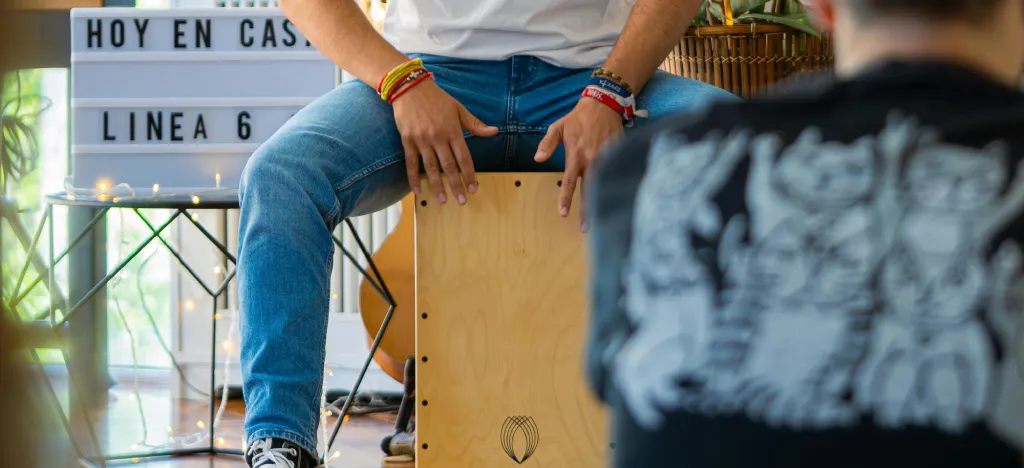 If you’re someone who can’t help tapping along to a beat, why not give percussion a go? While a full drum kit takes coordination and practice, hand percussion instruments like bongos and cajón offer a simple, accessible way to start playing beats right away. Plus, they’re great for jamming with friends or just letting off a bit of steam after a long day.
If you’re someone who can’t help tapping along to a beat, why not give percussion a go? While a full drum kit takes coordination and practice, hand percussion instruments like bongos and cajón offer a simple, accessible way to start playing beats right away. Plus, they’re great for jamming with friends or just letting off a bit of steam after a long day.
Why learn to drum?
No notes or melody to learn—just rhythm and timing
Great for stress relief and jamming with others
Bongos and cajón require minimal setup and are easy to transport
You can play along with songs within minutes
⚡How fast can you learn to drum?
Most beginners can play along to simple rhythms within minutes. With practice, you can develop more complex grooves and hand techniques within a few weeks.
Harmonica: A tiny instrument that’s easy to play
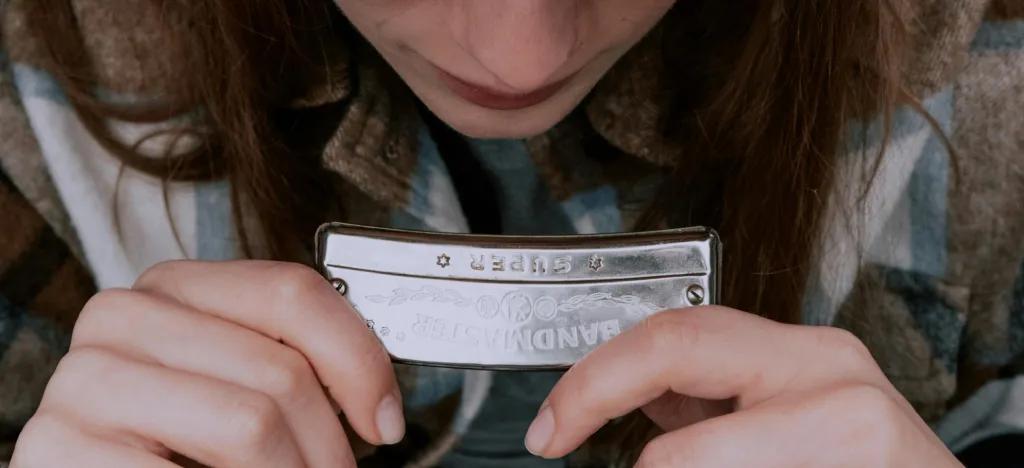 The harmonica is proof that good things come in small packages. It’s like a tiny blues machine that fits in your pocket and turns you into a musical superhero — no cape required. Often seen as one of the easiest instruments to learn, its compact size, affordability, and simple blow-and-draw technique make it a fantastic choice for blues and folk music lovers. Whether you’re playing solo or adding some flair to a jam session, the harmonica is a crowd-pleaser — and it fits right in your pocket.
The harmonica is proof that good things come in small packages. It’s like a tiny blues machine that fits in your pocket and turns you into a musical superhero — no cape required. Often seen as one of the easiest instruments to learn, its compact size, affordability, and simple blow-and-draw technique make it a fantastic choice for blues and folk music lovers. Whether you’re playing solo or adding some flair to a jam session, the harmonica is a crowd-pleaser — and it fits right in your pocket.
What is harmonica easier to learn?
No notes or melody to learn—just rhythm and timing
Great for stress relief and jamming with others
Bongos and cajón require minimal setup and are easy to transport
You can play along with songs within minutes
⚡How fast can you learn harmonica?
Most beginners can play along to simple rhythms within minutes. With practice, you can develop more complex grooves and hand techniques within a few weeks.
What is the hardest instrument to learn?
Some instruments are notoriously difficult—requiring years of practice before you sound good. Here are the most challenging ones:
🎻 Violin – No frets to guide finger placement, requires precise bow control
🎷 Oboe – Difficult reed control, requires advanced breath support
🎺 French Horn – One of the hardest brass instruments to play in tune
🎹 Organ – Requires hand and foot coordination while reading multiple music staves
🎸 Classical Guitar – Involves complex fingerstyle techniques
📖 Research-backed claim: According to multiple music education studies, the violin, oboe, and French horn have some of the highest dropout rates among beginner musicians due to their steep learning curve
How to choose the right instrument for you
If you’re still undecided, ask yourself:
What kind of music do I love? If you’re into folk, maybe try the ukulele or guitar. Blues fan? The harmonica could be your thing.
How much space do I have? A grand piano might not fit in your flat, but a keyboard or bongos definitely will.
What’s my budget? Some instruments are cheaper than others, so pick one that works for your wallet.
How much time can I commit? Learning an instrument takes practice—think little and often rather than marathon sessions.
Picking up an instrument isn’t just about learning to play; it’s about finding something that makes you want to play. Every instrument has a story to tell—and you’re the one who gets to tell it. So take your time, experiment, and most importantly, enjoy the ride. After all, every music legend was once a beginner.
Ready to get started?
Explore ArtMaster’s beginner-friendly courses designed to make learning fun, easy, and rewarding — no matter which instrument you choose!
Start your 7-day free trial today!
